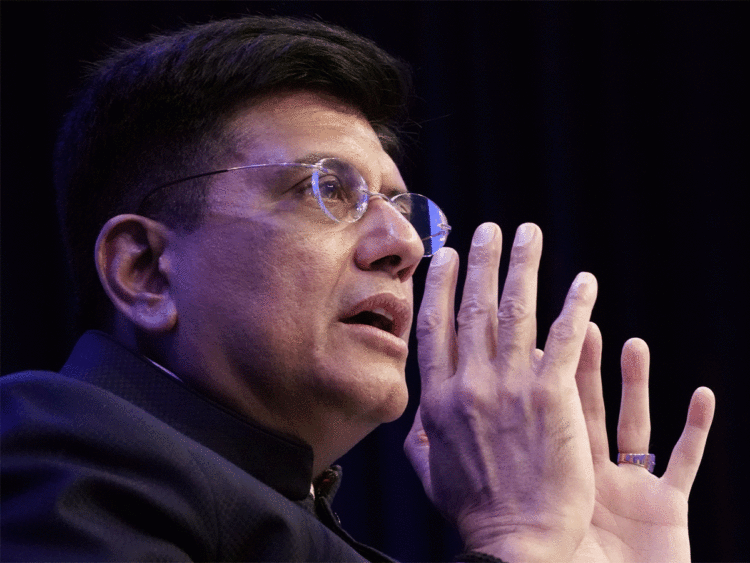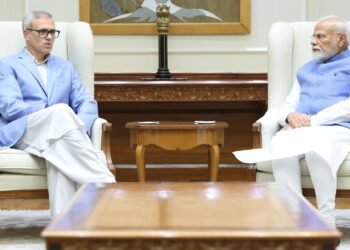The ongoing debate around the EU’s environmental regulations and trade measures reflects broader concerns about the balance between climate action and trade fairness.
India, along with other major agriculture-exporting countries such as Brazil, Indonesia, and the United States, has voiced strong objections to the European Union’s Deforestation Regulation (EUDR). The regulation, adopted in May 2023, aims to prevent the import of products linked to deforestation in the EU market. However, countries like India see these measures as unfair and harmful to their industries.
Piyush Goyal’s Strong Response
Union Commerce and Industry Minister Piyush Goyal, speaking at the launch of the Federation of European Business in India (FEBI), criticized the EU’s deforestation rules and carbon tax, describing them as unfair. Goyal highlighted how Indian industries are being confronted with what he called “unfair rules” around the EU’s Carbon Border Adjustment Mechanism (CBAM) and other measures.
Impact on Indian Exports
The EUDR covers products such as coffee, leather, oil cake, wood furniture, paper, and paperboard, with plans to expand the product list. These regulations are expected to impact India’s exports to the EU, particularly in products like coffee, leather hides, and paperboard, which are worth around USD 1.3 billion annually.
The Global Trade Research Initiative (GTRI) has also noted the adverse effects of these regulations on India’s trade. The restrictions could reduce India’s market access in the EU, negatively affecting businesses that depend on these exports.
Carbon Tax Objections
India has also raised concerns regarding the EU’s CBAM, often referred to as the “carbon tax.” The CBAM imposes additional duties on seven carbon-intensive sectors, including steel, cement, fertilizers, aluminum, and hydrocarbons. The tax is set to come into effect on January 1, 2026, and will apply to imports from non-EU countries, impacting Indian manufacturers significantly.

Finance Minister Nirmala Sitharaman has called the CBAM unilateral and arbitrary, emphasizing that it will hurt India’s exports once implemented. She pointed out that these measures go against the spirit of fair trade and multilateral agreements.
Retaliatory Actions and Bilateral Issues
In response to the EU’s stance, India has proposed imposing retaliatory customs duties, under World Trade Organization (WTO) norms, on specific goods imported from the EU. This proposal comes as both sides have been unable to find common ground on the EU’s safeguard measures on steel products.
Goyal accused the developed world of disrespecting multilateral agreements on climate change. He highlighted that the Paris Agreement stipulated that developed countries would contribute to long-term financing, grants, and technology transfer to mitigate environmental problems.
However, he argued that the European Union’s actions are undermining the premise of the Paris Climate Agreement, which was established at COP 21.
Steel Safeguard Measures
The minister also criticized the EU’s safeguard duty measures on some steel products, calling them irrational and inconsistent with WTO laws. The issue has been a subject of ongoing discussions for the past five to six years, and Goyal said India is now considering other measures since negotiations have failed to yield satisfactory outcomes.
“India does not engage in unfair trade practices,” Goyal asserted. “Yet we are being subjected to additional duties. After six years of discussions, we have to take other measures to safeguard our industries.”
He added that these measures would not be conducive to maintaining the positive business relations that India and Europe have shared over the years. The minister expressed hope that these issues could be addressed through bilateral discussions to ensure mutual ease of doing business.
Labour and Investment Issues
Goyal also addressed concerns regarding labor issues and bilateral investment. He noted that Indian companies have largely not faced significant labor problems in recent years, unlike some European companies operating in India. “It would be a good idea to take up all these issues bilaterally so that there can be ease of doing business on both sides and we can support each other in expanding trade,” Goyal stated.
He also responded to EU concerns regarding the bilateral investment treaty, highlighting India’s commitment to protecting foreign investments. Goyal cited the example of a Swedish company that has operated in India for over 120 years, emphasizing India’s track record of honoring investments. He also reassured the EU that retrospective taxation, such as in the Vodafone case, has been withdrawn and publicly denounced by his party.
A Call for Bilateral Solutions
Goyal concluded his address by emphasizing that contentious issues such as labor standards, investment protection, and environmental policies could best be resolved through bilateral discussions. He reiterated India’s commitment to expanding trade relations with the EU but stressed the importance of fair and transparent policies that benefit both sides.
The criticism of the EU’s policies comes amidst growing tensions between developed and developing countries regarding climate obligations and trade fairness. Many developing countries feel that they are being asked to pay for environmental damage historically caused by developed countries while also being subjected to protectionist policies that threaten their economic growth.
Below is a summary of key facts regarding the European Union’s deforestation regulation and carbon tax:
| Key Facts | Details |
|---|---|
| EU Deforestation Regulation (EUDR) | Adopted on May 16, 2023, to prevent import of products linked to deforestation. |
| Products Covered | Coffee, leather, oil cake, wood furniture, paper, paperboard (more products may be added). |
| Impact on India | Exports worth USD 1.3 billion could be affected. |
| Carbon Border Adjustment Mechanism (CBAM) | Imposes additional duties on carbon-intensive imports like steel, cement, and aluminum. |
| Implementation Date | January 1, 2026. |
| Indian Response | Proposed retaliatory duties on EU imports under WTO norms. |
| Ministerial Concerns | Measures are unilateral, arbitrary, and disrespectful to multilateral agreements. |
The ongoing debate around the EU’s environmental regulations and trade measures reflects broader concerns about the balance between climate action and trade fairness. As countries like India, Brazil, and Indonesia continue to push back against these measures, it remains to be seen how the EU will navigate these challenges and whether a compromise can be reached.
(India CSR)























